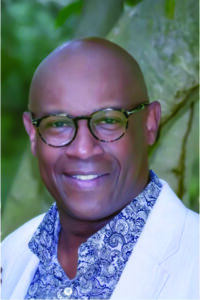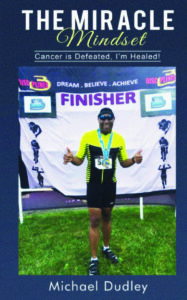 Michael Dudley
Michael Dudley
What do people feel when they receive a cancer diagnosis?
Shock. Disbelief. Anger. Sadness.
Feeling whole… being
healed… healthy.
Admittingly, words like “whole”, “healed”, and “healthy” might not come into the mix of the myriad of emotions often. However, for Michael Dudley, a POQC member, the faith and motivation to get better transported him to the vision of the future, where he undoubtedly would be well again.
Keeping up with his annual physical exams and scheduling the recommended tests, Michael was already familiar with the colonoscopy process. When it was time to get the procedure done again, he felt it lasted longer than the previous one. With no major symptoms of concern to report, and being in top physical shape, Michael’s diagnosis of colorectal cancer (CRC) was an unexpected and unwelcome addition to his busy life. In fact, Michael was scheduled to compete in his first triathlon the week of that doctor’s appointment. The diagnosis shook his world, but he had devoted too much time preparing for the event for cancer to stop him. Michael participated in the competition and crossed the finish line. It was time to deal with the next challenge. He took the focus with which he handled the training and translated it into a disciplined and methodical approach to treatment. As Michael meditated and spoke to God, he was already there – healed and whole once again.
A sigmoid colon resection surgery was planned. As Michael lay on the operating table, sedated and therefore not knowing what was happening around him, the surgeon paused. “Do you remember which side of the colon the cancer is?”, he asked those present. No one knew. Notes were not clear. Nobody dared move forward. An incision in the wrong spot could mean dire consequences. What this situation required was consent for another colonoscopy to identify the exact location of the cancer. Once Michael’s wife signed the paper, the medical team performed the procedure, and, ultimately, surgery to remove the cancer.
Michael had so many questions. What happened to the notes? How was the OR even booked without a clear sign-off? Thank goodness the surgeon paused, but why was the doctor placed in this situation at all? What could have happened had the team made the wrong call? Despite those questions, Michael was declared cancer-free 30 days after his diagnosis. He credits early detection and intervention in his successful recovery. Colorectal cancer is frequently detected when it’s late. And often when it’s too late. In black patients, CRC is disproportionately misdiagnosed or diagnosed late (1). Colorectal cancer is the third most common cancer in both men and women in the United States and the second most common cause of cancer-related death. Black patients are disproportionately affected; they have a >20% higher incidence rate than in white patients, and an even larger difference in mortality (2). Unconscious bias, inequity, lack of access to healthcare, stigma, socioeconomic status, and even a zip code factor into the disparity which leads to increased mortality in black patients. Michael had access to quality health care. Many patients don’t.
Michael took some time to assess the chapter of his life and determine where he wanted to go next. The daily devotion, walks, and rest centered him. After a period of self-reflection Michael realized he needed to contribute to understanding the disease. Many black patients have a deep-seated and historically justified distrust of the medical system. Oftentimes, they are reluctant to share details about family history, habits, and lifestyles. He joined patient groups, determined to become an active voice contributing to research and improving patient outcomes.
Family life, faith, work, and patient advocacy efforts kept Michael busy for the next three years. Once again, Michael attended a routine physical exam, as he did every year. An unexpected, disturbing, and infuriating diagnosis of prostate cancer followed.
Feeling whole… being healed… healthy. Michael envisioned himself cancer-free. He became his body’s steward. Adopting a strategy of “DEWing It” (Diet, Exercise, and Weight Management), Michael’s goal was to achieve that envisioned future. On a journey as complicated and overwhelming as cancer, he was committed to being in control over what he could.
 He couldn’t control his treatment. He could control how he treated his body right to minimize the chances of recurrence.
He couldn’t control his treatment. He could control how he treated his body right to minimize the chances of recurrence.
He couldn’t control a provider ignoring some alarming symptoms that could have led to an earlier detection. He could control his outcome by seeking a second opinion by a black urologist.
He couldn’t control the stigma associated with prostate cancer, particularly in black men. Through POQC and other patient groups, he could control how he talked about it, how he educated other men in his community, and how he drew clinicians’ attention to the differences of diagnostics for prostate cancer in black men.
Black men’s symptoms present earlier, the disease is more aggressive, and the mortality rate is higher than that of white men. Black men have less access to treatment options and oftentimes experience longer delays between diagnosis and treatment (3). Inequity and structural racism, cultural sensitivity, lack of trust and poor patient-provider communication, and hesitancy to participate in clinical research all feed into the overwhelming reality of black men being disproportionately affected by prostate cancer.
Michael is now a two-time cancer survivor. He leveraged his faith and strength, used the resources available, and exercised a tireless commitment to finding the path forward. Yet, with the clear understanding of just how blessed he is, Michael knows that as clinicians we must do better for our patients – so we can all be Whole. Healed. Healthy.
Click here to watch Michael in the 2021 Michigan Regional Emmy Award winning short story “Movement”.
Michael’s book “Miracle Mindset” is available on Amazon.
- Augustus GJ, Ellis NA. Colorectal Cancer Disparity in African Americans: Risk Factors and Carcinogenic Mechanisms. Am J Pathol. 2018 Feb;188(2):291-303. doi:10.1016/j.ajpath.2017.07.023. Epub 2017 Nov 9. PMID: 29128568; PMCID: PMC5785537
- Siegel R, Desantis C, Jemal A. Colorectal cancer statistics, 2014. CA Cancer J Clin. 2014 Mar-Apr;64(2):104-17. doi: 10.3322/caac.21220. Epub 2014 Mar 17. PMID: 24639052.
- Lillard JW Jr, Moses KA, Mahal BA, George DJ. Racial disparities in Black men with prostate cancer: A literature review. Cancer. 2022 Nov 1;128(21):3787-3795. doi: 10.1002/cncr.34433. Epub 2022 Sep 6. PMID: 36066378; PMCID: PMC9826514.